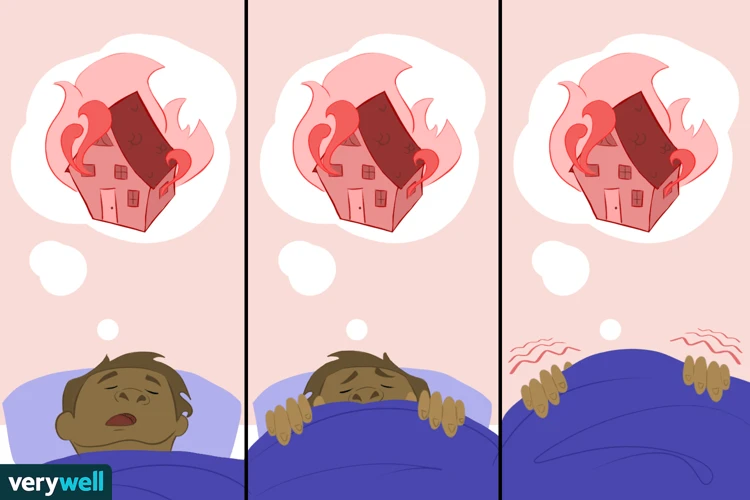Have you ever woken up in a cold sweat, heart pounding, after experiencing a recurring nightmare? These unsettling dreams can leave us feeling anxious and unsettled, disrupting our sleep and affecting our overall well-being. If you are tired of being haunted by these nocturnal terrors, you’re in the right place. In this article, we will explore the world of recurring nightmares, uncovering their causes and impact, while providing you with effective techniques to overcome them step-by-step. By understanding the root of your nightmares and implementing practical strategies, you can reclaim your nights and enjoy restful, peaceful sleep once again. So, let’s dive in and banish those recurring nightmares from your life for good.
Understanding Recurring Nightmares

Recurring nightmares can be quite perplexing and unsettling experiences that occur during our sleep. These nightmares are characterized by having the same or similar themes, settings, or events replaying in our dreams repeatedly. It can be helpful to analyze and understand the nature of recurring nightmares in order to effectively overcome them. Recurring nightmares often stem from unresolved issues in our subconscious mind or unresolved traumas in our waking lives. By delving into the depths of our dreams, we can uncover hidden meanings and symbols that may provide clues to the underlying causes of our nightmares. Exploring the symbolism and themes of recurring nightmares can also help us identify any patterns or triggers that may be contributing to their occurrence. It is important to note that recurring nightmares are different from night terrors, as night terrors are characterized by sudden awakenings with intense fear and physical symptoms, usually occurring in the first few hours of sleep. Understanding the distinction between recurring nightmares and night terrors can be crucial in addressing and effectively overcoming them.
Causes of Recurring Nightmares

Recurring nightmares can have various underlying causes, often originating from a combination of psychological, emotional, and physiological factors. One common cause is stress and anxiety, which can manifest in our dreams as recurring themes or situations that reflect our worries and fears. Past traumas, such as accidents, abuse, or loss, can also resurface in our nightmares, replaying in our subconscious as our minds try to process and heal from these experiences. Additionally, sleep disorders, such as insomnia or sleep apnea, can contribute to the occurrence of recurring nightmares. These disruptions in our sleep patterns can lead to increased dream intensity and frequency. It is important to note that recurring nightmares can affect individuals of all ages, including children, whose nightmares may be influenced by factors such as developmental changes or exposure to frightening content. Understanding the potential causes of recurring nightmares is an essential step towards finding effective solutions and achieving restful, peaceful sleep. (For more information on nightmares in children and possible solutions, check out our article here.)
Stress and Anxiety
Stress and anxiety play a significant role in the occurrence of recurring nightmares. When we experience high levels of stress and anxiety in our daily lives, it can seep into our subconscious mind and manifest in the form of unsettling dreams. The emotional and psychological toll of stress and anxiety can disrupt the quality of our sleep, making us more susceptible to nightmares. Additionally, unresolved stress and anxiety can create a vicious cycle, as recurring nightmares can further exacerbate our levels of stress and anxiety, creating a continuous loop. It’s essential to address and manage stress and anxiety in order to overcome recurring nightmares. This can be done through various techniques such as practicing relaxation exercises, engaging in stress-reducing activities, and seeking professional help if needed. By effectively managing stress and anxiety, we can alleviate their impact on our sleep and reduce the occurrence of recurring nightmares. If you want to delve deeper into the difference between nightmares and night terrors, you can read our article on nightmares versus night terrors. It’s important to note that certain medications can also impact the frequency and intensity of nightmares. If you suspect that medication is contributing to your recurring nightmares, it’s advisable to consult with a healthcare professional to explore alternative options. Learn more about the potential impacts of medication on nightmares in our article on medication and its impact on nightmares.
Past Trauma
Past trauma can play a significant role in the occurrence of recurring nightmares. Traumatic experiences, such as accidents, violence, or abuse, can leave a lasting impact on our subconscious mind. When these experiences remain unresolved, they may manifest in our dreams as recurring nightmares. These nightmares often serve as a way for our subconscious to process and attempt to work through the traumatic event. The themes and symbols in these nightmares may directly or symbolically represent elements of the past trauma. It is important to acknowledge and address these past traumas in order to overcome recurring nightmares. Seeking therapy or counseling can be helpful in navigating and processing these experiences. Therapists may use techniques such as trauma-focused therapy or eye movement desensitization and reprocessing (EMDR) to help individuals work through and heal from past traumas. Additionally, engaging in self-care practices, such as journaling, meditation, or engaging in creative outlets, can aid in the healing process. It is crucial to create a safe and supportive environment for ourselves as we confront and process our past traumas, ultimately leading to a decrease in recurring nightmares and an improvement in overall well-being.
Sleep Disorders
There are various sleep disorders that can contribute to the occurrence of recurring nightmares. Understanding these disorders can help in addressing the root causes and finding effective solutions. One common sleep disorder that can disrupt the sleep cycle and lead to recurring nightmares is insomnia. Insomnia is characterized by difficulty falling asleep or staying asleep, resulting in poor sleep quality. The lack of restful sleep can increase the likelihood of experiencing nightmares. Another sleep disorder that can contribute to recurring nightmares is sleep apnea. Sleep apnea is a condition in which a person’s breathing is repeatedly interrupted during sleep, leading to fragmented sleep and potentially vivid, intense dreams. Additionally, restless leg syndrome (RLS) and narcolepsy are sleep disorders that can disrupt the sleep cycle and contribute to the occurrence of nightmares. RLS causes uncomfortable sensations in the legs, leading to an urge to move them, while narcolepsy involves excessive daytime sleepiness and sudden sleep attacks. Both of these conditions can disrupt the overall quality of sleep and contribute to the frequency of nightmares. It is important to address any underlying sleep disorders with the help of a medical professional to improve sleep quality and decrease the occurrence of recurring nightmares.
Impact of Recurring Nightmares

The impact of recurring nightmares can be far-reaching, affecting various aspects of our lives. One of the primary consequences is disrupted sleep patterns, leading to chronic fatigue and daytime drowsiness. This can impair our cognitive functions, concentration, and overall productivity. Recurring nightmares can also have a negative impact on our mental health, contributing to increased levels of anxiety, stress, and even depression. The emotional distress caused by these nightmares can spill over into our waking lives, leading to heightened feelings of fear, helplessness, and unease. Additionally, the constant anticipation of experiencing another nightmare can create a heightened state of anxiety, making it difficult to relax and fully enjoy life. The overall quality of our social interactions and relationships can also be negatively affected, as the emotional toll of recurring nightmares can make it challenging to engage fully with others. The fear and anxiety associated with these nightmares can lead to avoidance behaviors, limiting our willingness to engage in activities or visit places that may trigger memories of the recurring nightmare. It is crucial to address the impact of recurring nightmares in order to restore a sense of well-being and regain control over our sleep and daily lives.
Effective Techniques for Overcoming Recurring Nightmares

Overcoming recurring nightmares requires a proactive approach that combines self-reflection, stress management, and the development of healthy sleep habits. Keeping a dream journal can be a powerful technique for understanding the patterns and symbolism in your nightmares. By recording your dreams immediately upon waking, you can analyze recurring themes and emotions, gaining insights into their underlying causes. Identifying triggers, such as certain foods, movies, or activities, can help you avoid potential nightmare inducers. Managing stress and anxiety is crucial, as these factors often contribute to the frequency and intensity of nightmares. Practicing relaxation techniques, such as deep breathing exercises or meditation, can reduce overall stress levels, promoting more peaceful sleep. Seeking professional help from therapists trained in dream analysis or nightmare treatment can provide additional support and guidance. Creating a peaceful sleep environment, engaging in visualization and imagery techniques, and practicing self-care and a daily routine are all essential elements in overcoming recurring nightmares and achieving restful, rejuvenating sleep.
Keep a Dream Journal
One effective technique for overcoming recurring nightmares is to keep a dream journal. Keeping a dream journal involves recording your dreams immediately after waking up. This practice can help you gain insight into the patterns, themes, and emotions present in your recurring nightmares. Start by keeping a notebook and pen next to your bed, or even use a notes app on your smartphone. As soon as you wake up, take a few moments to jot down any details you can remember from your dream, no matter how small or insignificant they may seem. It’s important to capture as much information as possible, including specific images, emotions, and any notable events or characters. The act of writing it down helps solidify your dream memories and allows you to reflect on them later. By consistently recording your dreams over time, you may begin to notice connections or patterns that provide valuable insights into the underlying causes of your nightmares. Additionally, reviewing your dream journal periodically may also help you identify triggers that lead to the recurrence of certain nightmares. Whether you use a traditional journal or a digital format, the key is to make the dream journal a regular part of your morning routine.
Identify Triggers
Identifying triggers is a crucial step in overcoming recurring nightmares. Triggers are specific stimuli or events that can bring about the occurrence of nightmares. By pinpointing these triggers, we can better understand the root causes behind our recurring nightmares and take steps to alleviate their impact. To identify triggers, consider keeping a dream journal, documenting your dreams upon waking. Look for common elements, themes, or emotions that appear in your nightmares. For example, it could be a certain person, a specific location, or a particular situation that consistently appears in your dreams. This information can provide valuable insights into the underlying triggers that may be contributing to the recurrence of your nightmares. Additionally, pay attention to your daily activities, experiences, and emotions as they may also serve as triggers. Notice if there are any patterns or connections between your waking life and the themes of your nightmares. By gaining awareness of these triggers, you can then take proactive steps to manage and address them, ultimately reducing the frequency and intensity of your recurring nightmares.
Manage Stress and Anxiety
Managing stress and anxiety is a key component in overcoming recurring nightmares. The presence of stress and anxiety in our daily lives can contribute to the frequency and intensity of nightmares. Implementing effective stress management techniques can help alleviate the occurrence of these unsettling dreams. One method to manage stress and anxiety is through regular exercise. Engaging in physical activity, such as jogging, yoga, or dancing, not only helps release endorphins but also serves as a healthy outlet for stress. Additionally, practicing relaxation techniques, such as deep breathing exercises or meditation, can help calm the mind and reduce anxiety levels. Developing a consistent sleep routine can also play a vital role in managing stress and anxiety. Creating a peaceful sleep environment by keeping the bedroom clutter-free, using dim lights, and establishing a calming pre-bedtime routine can promote relaxation and a sense of well-being. It is important to remember that managing stress and anxiety is an ongoing process, and finding the techniques that work best for you may require some trial and error. By incorporating stress management strategies into your daily routine, you can create a more balanced and calm mental state, which, in turn, can help reduce the occurrence of recurring nightmares.
Practice Relaxation Techniques
Practice Relaxation Techniques:
1. Deep Breathing: Deep breathing is a simple yet powerful relaxation technique that can help calm your mind and body. Find a quiet and comfortable place, close your eyes, and take slow, deep breaths. Inhale deeply through your nose, feeling your abdomen expand, and exhale slowly through your mouth, releasing any tension or stress. Focus on your breath and let go of any racing thoughts or worries.
2. Progressive Muscle Relaxation: This technique involves systematically tensing and then relaxing each muscle group in your body to release muscle tension and promote relaxation. Start by tensing the muscles in your toes, then gradually work your way up to your calves, thighs, abdomen, chest, arms, and face. Hold the tension for a few seconds and then release, allowing the muscles to relax completely.
3. Guided Imagery: Guided imagery involves using your imagination to create soothing and calming mental images. Find a quiet place, close your eyes, and imagine yourself in a peaceful and serene environment. Visualize every detail, such as the sights, sounds, and smells, to fully immerse yourself in this relaxing scene. This technique can help shift your focus away from negative thoughts and promote feelings of relaxation.
4. Meditation: Meditation is a powerful relaxation technique that involves focusing your attention and eliminating the stream of thoughts that may be causing stress or anxiety. Find a comfortable position, close your eyes, and focus on your breath or a specific mantra or phrase. Whenever your mind starts to wander, gently redirect your attention back to your breath or mantra. Regular practice of meditation can help calm your mind and reduce anxiety.
5. Yoga or Stretching: Engaging in gentle yoga poses or stretching exercises can help release tension in your muscles and promote relaxation. Yoga combines physical postures with conscious breathing and relaxation techniques to create a calming and rejuvenating experience. Incorporating a regular yoga or stretching routine into your daily or nighttime routine can help reduce stress and anxiety, leading to a more peaceful sleep.
Remember, relaxation techniques require practice and consistency to be effective. Experiment with different techniques and find what works best for you. By integrating these relaxation techniques into your daily routine, you can effectively manage stress and promote a sense of calm, helping to overcome recurring nightmares.
Seeking Professional Help

If recurring nightmares persist and significantly impact your daily life, seeking professional help can be a crucial step towards finding relief. Consulting with a mental health professional, such as a therapist or psychologist, can provide you with the necessary support and guidance to navigate through your nightmares. These professionals have the expertise and knowledge in dream analysis and sleep disorders to help uncover the root causes of your recurring nightmares. They can assist you in developing coping strategies, exploring underlying traumas or anxieties, and providing therapeutic interventions tailored to your specific needs. Cognitive-behavioral therapy (CBT) is a commonly used approach for treating recurring nightmares. This type of therapy focuses on identifying and changing negative thought patterns and behaviors associated with nightmares. Additionally, medication may be prescribed in certain cases when nightmares are a symptom of an underlying mental health condition, such as post-traumatic stress disorder (PTSD). Always consult with a healthcare professional to determine the most suitable path for your individual situation. Seeking professional help can empower you with the necessary tools and support system to overcome recurring nightmares and regain control over your sleep and well-being.
Creating a Peaceful Sleep Environment

Creating a peaceful sleep environment is essential for overcoming recurring nightmares and promoting restful sleep. One important aspect of establishing a peaceful sleep environment is practicing good sleep hygiene habits. This includes ensuring that your bedroom is dark, quiet, and at a comfortable temperature. Investing in blackout curtains, earplugs, or a white noise machine can help create a serene atmosphere that promotes uninterrupted sleep. It is also crucial to reduce exposure to negative content before bedtime, as it can fuel anxiety and increase the likelihood of nightmares. Instead, engage in relaxing activities such as reading a book or listening to soothing music. Establishing a consistent bedtime routine can signal to your body and mind that it is time to unwind and prepare for sleep. By prioritizing these elements and creating a tranquil sleep haven, you can enhance the quality of your sleep and minimize the occurrence of recurring nightmares.
Sleep Hygiene Habits
Implementing effective sleep hygiene habits can greatly contribute to creating a peaceful sleep environment and reducing the occurrence of recurring nightmares. Here are some key sleep hygiene habits to incorporate into your daily routine:
- Stick to a Consistent Sleep Schedule: Establishing a regular sleep schedule by going to bed and waking up at the same time each day helps regulate your body’s internal clock and promotes better sleep quality.
- Create a Relaxing Bedtime Routine: Engage in activities that promote relaxation and signal to your body that it’s time to wind down and prepare for sleep. This could include reading a book, practicing gentle stretching exercises, or enjoying a warm bath.
- Optimize Your Sleep Environment: Make your bedroom a tranquil and comfortable space conducive to sleep. Ensure that the room is dark, quiet, and at a cool temperature. Consider using earplugs, eye masks, or white noise machines to create an atmosphere of calmness.
- Avoid Stimulants Before Bed: Limit the consumption of caffeine, nicotine, and alcohol close to bedtime, as these substances can interfere with your sleep patterns and contribute to restless nights.
- Limit Screen Time: Electronic devices emit blue light, which can disrupt your sleep-wake cycle. Avoid using screens like smartphones, tablets, and laptops for at least an hour before bed. Instead, engage in relaxing activities such as reading a book or listening to calming music.
- Make Your Bed a Sanctuary: Reserve your bed for sleep and intimacy only. Avoid working, studying, or engaging in stressful activities in your bed, as this can create associations between your bed and wakefulness rather than relaxation.
- Keep Your Bedroom Clutter-Free: A tidy and organized bedroom can contribute to a sense of calmness and promote better sleep. Remove any unnecessary clutter and create a serene environment that promotes relaxation.
By incorporating these sleep hygiene habits into your daily routine, you can create an optimal sleep environment that promotes restful nights and reduces the likelihood of recurring nightmares.
Reduce Exposure to Negative Content
Reducing exposure to negative content, both before bedtime and throughout the day, can play a significant role in overcoming recurring nightmares. Negative content, such as scary movies, violent TV shows, or disturbing news, can greatly impact our subconscious mind and influence the content of our dreams. By consciously avoiding or minimizing exposure to such content, we can create a more positive and peaceful mental environment. Instead of watching horror movies or engaging with unsettling media before bed, try opting for more uplifting and calming activities. This could include reading a light-hearted book, listening to soothing music, or practicing mindfulness and meditation. It’s also important to be mindful of the content we consume throughout the day. Constant exposure to negative news stories or social media posts can heighten anxiety and stress levels, which may manifest in recurring nightmares. Instead, try to focus on positive and uplifting content that promotes relaxation and positivity. By maintaining a healthy mental diet and reducing exposure to negative influences, you can create a more nurturing sleep environment and potentially reduce the occurrence of recurring nightmares. (For more information on the impact of negative content, you can refer to the article: How Medication Can Impact Nightmares)
Establish a Bedtime Routine
Establishing a consistent bedtime routine is an essential habit when it comes to overcoming recurring nightmares. A bedtime routine signals to our brains that it is time to relax and prepare for sleep, creating a calm and peaceful environment conducive to avoiding distressing dreams. To establish an effective bedtime routine, start by setting a regular sleep schedule and sticking to it. This means going to bed and waking up at the same time every day, even on weekends. This consistency helps regulate our body’s internal clock and promotes better sleep quality. Additionally, incorporate relaxing activities into your routine, such as reading a book, taking a warm bath, or practicing gentle stretches or meditation. These activities help to unwind the mind, reduce stress, and create a sense of tranquility before drifting off to sleep. Another important element of a bedtime routine is creating a sleep-friendly environment. This includes ensuring your bedroom is dark, quiet, and at a comfortable temperature. Consider using blackout curtains, earplugs, or a white noise machine to minimize any disturbances that may disrupt your sleep and contribute to nightmares. Avoid the use of electronic devices before bed, as the blue light emitted from screens can interfere with your sleep. Instead, opt for relaxation techniques such as deep breathing or progressive muscle relaxation to calm your body and mind. By establishing a consistent and relaxing bedtime routine, you can set the stage for a peaceful night’s sleep, reducing the likelihood of recurring nightmares.
Visualization and Imagery Techniques

Visualization and imagery techniques are powerful tools that can help overcome recurring nightmares. By harnessing the power of our imagination, we can create positive and calming images to counteract the negative content of our dreams. One effective technique is to practice positive affirmations, where we consciously repeat positive statements to ourselves throughout the day and before bed. These affirmations can help reprogram our subconscious mind and replace the negative associations with positive ones. Another technique is imagery rehearsal therapy, where we vividly imagine a different, positive outcome for our recurring nightmare. By visualizing ourselves successfully navigating through the dream and resolving any conflicts, we can create new neural pathways in our brain and change our dream patterns over time. This can be combined with relaxation techniques, such as deep breathing or progressive muscle relaxation, to enhance the effectiveness of visualization. Remember, with practice and persistence, visualization and imagery techniques can be powerful tools in overcoming recurring nightmares and restoring a sense of peace and tranquility to our sleep.
Positive Affirmations
Positive affirmations are powerful tools that can help you overcome recurring nightmares and create a more positive mindset. By using positive affirmations, you can reprogram your subconscious mind and replace negative thoughts and beliefs with positive ones. When it comes to addressing recurring nightmares, positive affirmations can be used to counteract the negative narratives and emotions associated with these dreams.
To utilize positive affirmations effectively, start by identifying the specific negative thoughts or beliefs associated with your recurring nightmares. For example, if your nightmares are centered around feelings of fear and helplessness, you can create an affirmation such as “I am strong and capable, and I always have the power to overcome any challenges in my dreams and in my waking life.”
Repeat these affirmations daily, preferably in the morning and before bed, in a quiet and calm environment. Repetition is key in reinforcing positive beliefs and strengthening the messages you want to internalize. As you repeat these positive affirmations, visualize yourself successfully facing and conquering the challenges in your nightmares, feeling confident and in control. This visualization technique helps reinforce positive associations with these dreams and empowers you to take charge of your dream experiences.
Remember, positive affirmations work best when combined with other techniques, such as keeping a dream journal and practicing relaxation techniques. By incorporating positive affirmations into your daily routine, you can gradually shift your mindset, reduce the impact of recurring nightmares, and bring more positivity into your dream world and overall well-being.
Imagery Rehearsal Therapy
Imagery Rehearsal Therapy (IRT) is a powerful technique used to address recurring nightmares and promote more positive dream experiences. This therapeutic approach involves rewriting the script of your nightmares by visualizing and rehearsing new endings or alternative scenarios during waking hours. By actively engaging and reimagining the content of the nightmares, IRT aims to replace the negative emotions and images associated with the dreams with more positive and empowering ones.
To begin with, it is recommended to keep a dream journal and record detailed descriptions of your recurring nightmares. This will provide you with a clear understanding of the specific elements and themes that are present in your dreams. Once you have identified these key components, you can work on creating new, more positive storylines and endings for your nightmares.
During waking hours, spend some time visualizing these revised dream scenarios, focusing on positive outcomes, and introducing elements that counteract the fears or anxieties present in the original nightmares. Actively engage your senses and imagine yourself successfully navigating through the dream, feeling confident and in control. This process of rehearsing the new dream script helps to reprogram your subconscious mind and create new neural pathways that promote more positive dream experiences.
It can be helpful to practice IRT consistently over time, integrating these revised dream scenarios into your daily routine. The goal is for your mind to become familiar with the new endings and for these positive dream scripts to replace the recurring nightmares. With persistence and commitment, imagery rehearsal therapy has shown promising results in significantly reducing the frequency and intensity of recurring nightmares.
While IRT can be a helpful self-help technique, it is important to note that it may be beneficial to seek guidance from a mental health professional experienced in dream therapy or cognitive-behavioral therapy if you find that your recurring nightmares persist or significantly impact your daily life. They can provide personalized guidance and support to address any underlying issues contributing to the nightmares and suggest additional strategies to help you overcome them.
Imagery rehearsal therapy offers a proactive and empowering approach to tackling the distressing nature of recurring nightmares, allowing you to take control of your dreams and cultivate more positive dream experiences.
Self-Care and Daily Routine
Taking care of yourself and establishing a daily routine can play a significant role in overcoming recurring nightmares. Engaging in regular physical exercise is essential for promoting better sleep quality and overall well-being. Incorporate activities such as walking, yoga, or swimming into your routine to help relieve stress and anxiety, ultimately reducing the likelihood of nightmares. Additionally, maintaining a healthy diet that is rich in nutritious foods will provide your body with the necessary nutrients for optimal brain function and sleep regulation. Ensure that you have a consistent sleep schedule, going to bed and waking up at the same time each day. This helps regulate your body’s internal clock and promotes a more restful sleep. Prioritize self-care practices such as meditation, deep breathing exercises, or journaling to help calm your mind before bedtime. By implementing these self-care strategies and establishing a daily routine, you can create a conducive environment for peaceful sleep and effectively reduce the occurrence of recurring nightmares.
Physical Exercise
Physical exercise plays a vital role in our overall well-being and can have a positive impact on overcoming recurring nightmares. Engaging in regular physical activity has been shown to reduce stress and anxiety levels, improve sleep quality, and boost mood and mental health. When we exercise, our bodies release endorphins, which are natural mood enhancers that can help alleviate feelings of stress and anxiety. Additionally, physical exercise can tire us out physically, making it easier for us to fall asleep and experience deeper, more restful sleep. Incorporating activities such as walking, jogging, cycling, swimming, or yoga into our daily routine can be highly beneficial. Aim for at least 30 minutes of moderate-intensity exercise most days of the week. However, it’s important to note that exercising too close to bedtime may have an energizing effect, making it harder to fall asleep. It’s best to complete your workout a few hours before your intended bedtime. Remember, physical exercise not only strengthens our bodies but also helps calm our minds, making it an effective strategy for overcoming recurring nightmares. So lace up your sneakers, get moving, and start reaping the benefits of physical activity for a good night’s sleep.
Healthy Diet
Maintaining a healthy diet can have a significant impact on the quality of our sleep and help in overcoming recurring nightmares. A balanced diet rich in nutrients can promote better sleep patterns and overall well-being. When it comes to addressing nightmares, certain foods can be particularly beneficial. Including foods that contain tryptophan, such as turkey, chicken, nuts, and seeds, can help increase serotonin levels in the brain, promoting a sense of calm and relaxation. Additionally, foods rich in magnesium, such as leafy green vegetables, whole grains, and legumes, can help reduce muscle tension and promote deeper sleep. It is important to avoid consuming heavy meals close to bedtime, as this can lead to indigestion and disrupt sleep. Opting for lighter, easily digestible meals and avoiding stimulants like caffeine and nicotine can also contribute to a more peaceful sleep experience. Staying hydrated throughout the day by drinking enough water is important for overall health and can also contribute to better sleep quality. By making conscious choices regarding our diet, we can support healthy sleep patterns, reduce the chances of experiencing nightmares, and promote overall well-being.
Sleep Schedule
Establishing a consistent and healthy sleep schedule is essential when it comes to overcoming recurring nightmares. Having a regular sleep routine helps regulate our body’s internal clock and improves the quality of our sleep. To create a conducive sleep schedule, it is important to prioritize a consistent bedtime and wake-up time, even on weekends. This consistency helps train our body to naturally fall asleep and wake up at the desired times. Create a relaxing pre-sleep routine by engaging in activities such as reading a book, taking a warm bath, or practicing relaxation techniques. Avoid stimulating activities or screens close to bedtime, as they can disrupt the natural sleep-wake cycle. Additionally, ensure that your sleep environment is comfortable and conducive to sleep. Keep the bedroom cool, dark, and quiet, and consider using earplugs, eye masks, or white noise machines if necessary. By establishing a regular sleep schedule and creating a peaceful sleep environment, you can significantly reduce the occurrence of recurring nightmares and promote restful, rejuvenating sleep.
Conclusion
In conclusion, dealing with recurring nightmares can be a challenging and daunting task, but it is not an impossible one. By understanding the nature and causes of these nightmares, we can take proactive steps to overcome them. It’s important to remember that recurring nightmares often stem from stress, anxiety, past traumas, or sleep disorders. By keeping a dream journal, identifying triggers, managing stress and anxiety, practicing relaxation techniques, seeking professional help if needed, creating a peaceful sleep environment, using visualization and imagery techniques, and taking care of ourselves through self-care and a daily routine, we can gradually reduce the frequency and intensity of recurring nightmares. Remember, it may take time, patience, and persistence to see significant changes, but with the right strategies and mindset, you can regain control of your sleep and find peace of mind. Don’t let recurring nightmares continue to haunt you – take action today and reclaim your peaceful nights.
Frequently Asked Questions
1. Can recurring nightmares be a sign of an underlying mental health condition?
Yes, recurring nightmares can sometimes be an indication of an underlying mental health condition, such as post-traumatic stress disorder (PTSD), anxiety disorders, or depression. It is important to consult a healthcare professional if you suspect that your nightmares may be related to a mental health issue.
2. Are recurring nightmares more common in children or adults?
Recurring nightmares are prevalent in both children and adults. However, they may manifest differently in each age group. Children often have nightmares related to fears or anxieties, while adults may experience recurring nightmares stemming from past traumas or stressful situations.
3. How do I differentiate between a recurring nightmare and a regular dream?
A recurring nightmare is characterized by its repetitive nature, with similar themes, settings, or events occurring frequently during sleep. Regular dreams, on the other hand, vary in content and do not typically have a recurring pattern.
4. Can medication have an impact on recurring nightmares?
Yes, certain medications, such as antidepressants or beta-blockers, may sometimes affect dreams and sleep patterns, potentially leading to an increase or decrease in recurring nightmares. It is advisable to consult with a healthcare professional if you suspect your medication may be contributing to your nightmares.
5. How long do recurring nightmares typically last?
The duration of recurring nightmares can vary from person to person. Some individuals may experience recurring nightmares for a short period, while others may have them over a more extended period. With proper techniques and interventions, recurring nightmares can often be overcome.
6. Can recurring nightmares be related to past traumatic experiences?
Yes, recurring nightmares can be linked to past traumatic experiences. The subconscious mind often uses dreams to process and make sense of unresolved traumas. If you suspect your nightmares are tied to past traumas, seeking professional help or therapy can be beneficial.
7. Is it possible to prevent recurring nightmares?
While it may not be possible to completely prevent recurring nightmares, certain strategies and techniques can help reduce their frequency and intensity. By addressing underlying causes, managing stress levels, and implementing healthy sleep habits, you can minimize the occurrence of recurring nightmares.
8. Are there any natural remedies for recurring nightmares?
Yes, certain natural remedies, such as practicing relaxation techniques, maintaining a consistent sleep schedule, and incorporating soothing scents like lavender into your sleep environment, can help alleviate recurring nightmares. However, it is important to consult with a healthcare professional before trying any new remedies.
9. Can recurring nightmares impact the quality of sleep?
Absolutely. Recurring nightmares can disrupt your sleep, leading to feelings of restlessness, fatigue, and daytime drowsiness. The fear and anxiety experienced during nightmares can interfere with the natural sleep cycle, impacting the overall quality of sleep.
10. When should I consider seeking professional help for my recurring nightmares?
If your recurring nightmares are causing distress, interfering with your daily life, or persisting for an extended period, it may be beneficial to seek professional help. A healthcare professional or therapist can provide guidance and tailor techniques specifically for your situation to help overcome recurring nightmares.








